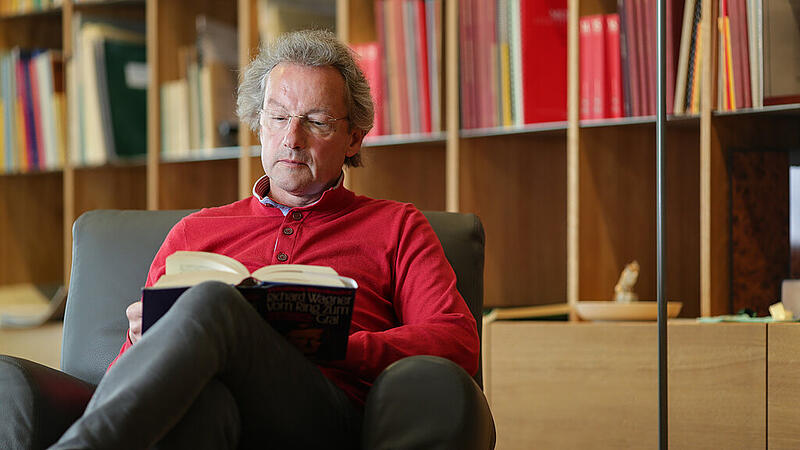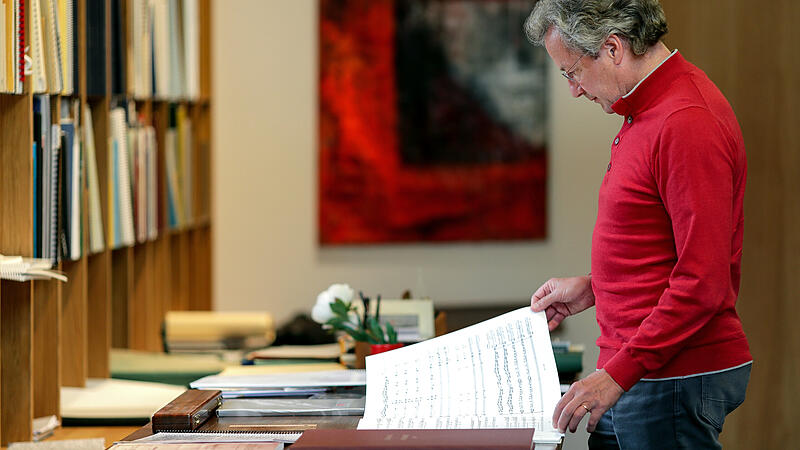Visiting star conductor Franz Welser-Möst – this article appeared in the OÖ Nachrichten from June 20, 2020:
From here, when the ships pass, I can hear people saying over the loudspeaker: The conductor Franz Welser-Möst lives in this house”, says conductor Franz Welser-Möst. Would he then hurry to shore and bow? “Exactly, that’s what I look like”he says and laughs.
There are 7000 square meters of lake ground in Litzlberg am Attersee, which Welser-Möst’s grandfather used to call in the century before last “sour meadows” bought. The conductor spent every summer of his childhood in this heavenly spot, and he has lived here with his wife Angelika since the mid-1990s. He tastefully converted one of the three houses on the property into a library. There the Mostdipf now rests, in the vicinity of innumerable scores and the handwritten corrected manuscript of “When I found the stillness”. It is the title of Welser-Möst’s book, which will be published on August 10th, and is autobiographical with a “Plea against the noise of the world” entangled.
The conductor, whose contract as head of the outstanding Cleveland Orchestra was extended until 2027, is as wrinkle-free as he is wiry. Nobody believes that he will be 60 on August 16th. When he talks about his love for this environment, it never sounds like someone with a sense of responsibility is affirming his location. What Franz Welser-Möst says, he means it. In this life everything seems to have been in its place from the beginning anyway. And yet Welser-Möst had a lot to clean up before he became one of the most sought-after conductors of his time.
“As was usual in a Catholic, conservative family back then, we children all learned to play an instrument. I was also an altar boy and boy scout, that was part of the worldview in our family biotope.” For the first three years of his life, seven of the Möst family lived in a two-room apartment in Linz, a few meters from the theater. Mother Marilies: a graduate engineer who was the first Upper Austrian woman to become a member of the National Council in 1979; Father Franz: a doctor – and five children, of which little Franz and his twin sister Elisabeth were the youngest. In 1963 they moved into their grandmother’s house in Wels.
The first television came in 1970
Welser-Möst, who put the name of the town he grew up in first because his mentor/manager Andreas von Bennigsen (1941-2000) encouraged him to do so, knows straight away which musical experience was his first: Die gut und mother who loves to play the piano. “I remember her Impromptu No. 3 in G flat major by Schubert, I must have been three years old then. We didn’t get a TV until the 1970’s so evening entertainment was set to music.” At the age of six he began violin lessons, “and for the first four years I hated it.” But that wasn’t discussed: Here, the violin, you play that, that’s it. In the municipal music school in Wels, this relationship turned into deep affection, and Welser-Möst experienced making music with other children as happiness – “just different than with the siblings, with whom it never took long to argue.”

Image: VOLKER Weihbold
In the spring of 1974, his parents read in the OÖN that a music high school would open in the state capital. From then on he commuted to Linz by train every day. “And yes, sport was part of our upbringing”says Welser-Möst, “I was even in the gymnastics club”but that expression flits across his face that promises his own self-mockery: “It was never my thing.” That’s what the conductor says, who hikes up the Hochlecken at five or five-thirty in the morning and is back home before his wife gets up. But to run 10,000 meters to the student champions or to play football at SV Urfahr in Linz like his brothers did would only have stopped someone like him with the prospect of becoming a professional violinist.
The turning point approached in a different way, along the route from Großraming to Steyr, on September 19, 1978: There were six of them in a Mercedes. The driver, a friend of Welser-Möst, was new to driving. The car skidded on a bridge and rolled over several times. The driver’s mother, who was sitting in the back next to Welser-Möst, died in the accident. All others were badly injured “my torso was in a cast for twelve weeks, three vertebrae were broken, and at first I had no feeling in my legs.” Two fingers on the left hand also stopped working due to a damaged nerve. The violinist’s career was over before it began. “It was a tragedy for the family whose mother died. It was different for me, probably because I was raised to make the best of bad luck.” Nature be kind anyway “because at first you don’t understand the scope of what happened there.”
disabled sister
Suddenly, Welser-Möst’s eyes smile because there is an addition to the athlete that he had never been before: “I didn’t know if I would be in a wheelchair. When the feeling in my legs returned, I started running – my goal was a marathon.” He did it in 1990, initially not in the hustle and bustle of a public race, but privately, together with a friend. “Later I ran the London marathon twice. I’ll show you the medals if you want.” No thanks, a man like him, who is disciplined down to the soles of his feet, is believed to be able to do this without documents. Maybe that’s why Welser-Möst wasn’t discouraged at the time, “because disability has always been an issue in our family.” Three years after him and his twin sister, another sister with a severe disability was born. Welser-Möst: “After eight months she died. My father was also a medical officer in Eferding and was responsible for the Hartheim Institute – in the image of humanity that was conveyed to us, disability was never excluded.”
Then conductor. As early as 1976, Balduin Sulzer commissioned him to conduct the school orchestra. Hidden, the teacher observed how the 16-year-old was doing. One can assume that he did well.


Image: VOLKER Weihbold
Sulzer always said to Welser-Möst: conducting begins with setting up the chair. What did he mean? Conducting is also an organizational profession. And just as Welser-Möst is brash enough not to betray the musical poems of everlasting masters to the zeitgeist, he also speaks up when the respectful organization of musical productions runs the risk of being disheveled by profit maximization. That’s why the Da Ponte cycle set by Artistic Director Alexander Pereira at the Salzburg Festival in 2013 drove him crazy: three “Cosi fan tutte”- Performances within five days! Unacceptable for singers! Welser-Möst gave up his conducting. Especially with that Pereira, who brought him to the Zurich Opera as music director in 1995 after he “was driven through the village as head of the London Philharmonic Orchestra (1990-1996, note).”, says Welser-Möst. Yes, he failed in England, after which he considered throwing everything away – and starting a degree, maybe law. But Pereira lured “and that was lucky.” In Zurich, Welser-Möst wanted to prove his suitability for this job once and for all, to the point of exhaustion. He succeeded in an incredible 43 premieres, some of which wrote opera history.
In 2010 he became General Music Director of the Vienna State Opera for four years. The collaboration broke up due to artistic differences with director Dominique Meyer. In 2011 and 2013 he was celebrated as conductor of the New Year’s Concert, his conducting at the Salzburg Festival is legendary, most recently the acclaimed Salome (2018, 2019), this summer Elektra is coming up.
In the end, Welser-Möst turns off again, to the singers, to those with six-figure annual salaries. “And they demand solidarity in the Corona period, but they only mean solidarity for themselves.” That’s the way it is with artists. He doesn’t count himself among them. “I’m a golden craftsman in the art business.” Who are the artists? These are those whose works he brings to life.
OÖNplus
This is what the fashion industry expects in the new year
The global village: St. Georgen and the limit of helpfulness
“The Wels general practitioners all work at the limit”
all OÖNplus articles
more from Hoamatland
books between times
“Everyone has a bird, I just have several”
From Austria’s first and last master dyer
Prayers, Celebrations and Football: The Life of a Sister
p.grubmueller@nachrichten.at


My themes
For your saved topics
found new items.

info By clicking on the icon you add the keyword to your topics.
info
Click on the icon to open your “my themes” Side. They have of 15 tags saved and would have to remove tags.
info By clicking on the icon you remove the keyword from your topics.
Add the theme to your themes.
Source: Nachrichten



